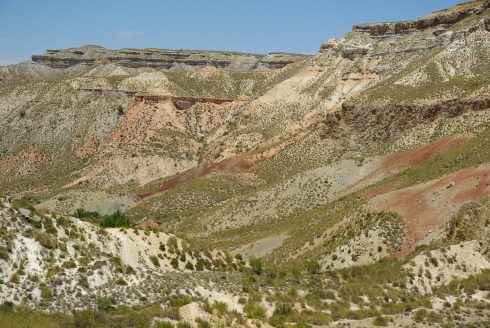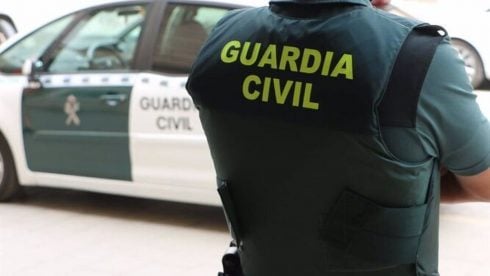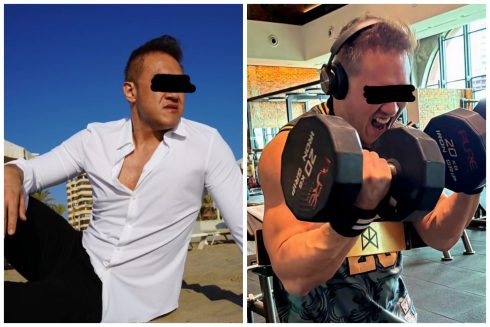This mass grave by the roadside was not the first in Spain to be unearthed in the past four years and it wouldn’t be the last. On each side were carobs and bright yellow and blue wild flowers, tranquil contrast to the macabre sight before us. Two men in the trench wore white overalls and had gauze masks over their mouths and were lifting out human bones and strips of clothing and placing them reverently on a length of tarpaulin. Behind them stood an idle mechanical earth-digger while beyond the fields of rosemary and artichokes rose the rugged purple-hued mountains, mute witness to the crimes that were committed here sixty-seven years ago.
I stood and watched while Clara Landera sat beside me on a green plastic chair by the edge of the road. On the ground behind her lay a bunch of desiccated flowers, one of many wreaths that littered the Spanish roadsides. Clara was seventy-one and wore the traditional black clothing of constant mourning and, despite the heat of the day, a black woollen shawl crossed her chest and was tucked into her black skirt’s waist-band. Her thick dark stockings were wrinkled, like her face. Mascara encircled Clara’s old eyes, rouge emphasised her sunken cheeks and her lips were painted carmine.
As I placed a heavy hand on her shoulder, her rough palm patted my knuckles. ‘Leon, my friend,’ she murmured, ‘I have no tears left to shed.’
I understood. For many years, while I pursued a career in intelligence and then private investigation – ‘Leon Cazador, Investigator’ my shingle announces in Alicante’s Calle Mayor – I had known her as Clara Marzal. We’d got on well even though I’m only half-Spanish. The other half being English, on my mother’s side, the result of one of those holiday romances that happily worked out. Then on one dreadful day Clara explained her tragic past. She had been sitting on her balcony, smoking a cigarillo, watching the television through her window. This way, she explained, she could catch the slight evening breeze. The screen showed a TVE news item about the digging up of a Civil War mass grave. As the bottle of white Valdepeñas emptied, her story gradually poured out.
While a new conflict raged across the world, the old Civil War that ended in Spring 1939 still claimed many lives. The reprisals of el Caudillo and his extreme right-wing followers killed thousands of los rojos – the communists – and Republican sympathisers. Nothing was said about the illegal executions and the abduction of children from their families. Nothing was done for over half a century. A conspiracy of silence born of fear. Even after the transición to democracy, the voices were stilled.
With the new millennium, however, some brave and outspoken individuals began to claim their family’s dead. They wanted them properly laid to rest.
Clara’s pueblo was like so many, riven by fanatics of the left and the right. The Civil War was anything but civil – it was barbaric. Old wounds were re-opened and old scores were settled with blood-letting on both sides.
At the dead of night in 1940, five men, three women and a child were taken away in a truck by village Falangists. Clara was that child and her mother Jacinta was with her. After a short drive, they stopped and were told to get out. Clara was forced to watch as the men in their blue shirts and leather webbing shot her mother, her grand-parents and the others. To this day Clara cannot wear anything coloured blue as it brings back the memories. The bodies were dumped unceremoniously into a ditch overgrown with weeds. An arm and hand stuck out and Clara was convinced it was her mother waving goodbye.
‘I cried with pain. And with hate.’ She had most of her own teeth and clenched her jaw tightly. ‘I may have been only four, but I have remembered all the names of those murderers. Some crimes live on long after they were committed, Leon.’ She gripped her rosary beads. ‘Now, before I go the way of all flesh, I want my mother’s remains put in her final resting place.’
That place of death figured in her nightmares until she was a teenager when, mercifully, she was able to move on and forget just a little. When I drove her to the spot where that horrendous crime was perpetrated, Clara was surprised how little had changed. Inland Spain was timeless, it seemed, compared with the raped over-developed coast. Long may that be so. We laid a wreath and on my return I kept my promise to Clara and helped to set in motion the paperwork for the disinterment.
Now, months later at the reburial, few witnesses had attended. Many villagers didn’t want to know. Others were not interested in raking over the past; let it lie, they said.
Pedro Jarillo was not one of those. He welcomed this solemn closure. He was in his eighty-sixth year and there was a haunted look about him, as if he could already feel the icy finger of his mortality on his shoulder. His bowed shape was slightly aloof, at the side of the small group of mourners.
In the town cementerio – the streets of the dead complete with lamps and pavements – readings from Lorca accompanied the mortal remains of Clara’s mother into the family wall niche.
After the ceremony, Clara strode purposefully up to Pedro and abruptly slapped his face. Turning on her heel, she walked away, leaving behind her loud whispers and murmurings of displeasure.
‘I’m Leon Cazador,’ I said as Pedro Jarillo opened the door. ‘You asked to see me.’
‘Si.’ He nodded and let me in. The room was cool and furnished with dark leather and wood and it smelled old, like him.
‘I know you are a friend of Clara,’ he said, ruefully stroking his rasping unshaved cheek.
‘Yes. She told me that you and your father were there that night with the other Falangists.’
Pedro sighed deeply. ‘Yes.’ His eyes were pale with age now but probably had been shining bright brown when he was a young man. He made a helpless gesture. ‘Many of those men who were with me have no regrets. They believed that what they did was necessary. They justified themselves, saying los rojos had committed crimes just as bad.’
‘But you do have regrets, is that it?’
‘You sound like my confessor, Señor Cazador!’
‘No, but I am a good listener,’ I said. ‘Tell me, Pedro Jarillo. Tell me why you cannot face speaking to Clara.’
Pedro’s father was one of the area’s Falangist leaders. He was acting on a recent denunciation stating that their prospective prisoners had been Republican sympathisers during the war. Like many in his position, he never questioned the credibility of the denunciation or the relationship of the people involved; old enmities and jealousies were not considered. ‘We have to be seen to be hard,’ he told his twenty-year-old son.
All the way to the home of the Landera family, Pedro had fretted. He knew what they were going to do. He couldn’t back out and bring shame to his father.
Shame had already cast its sombre shadow on Señor and Señora Landera since their simple daughter Jacinta had become pregnant. The village castigated them for neglecting poor unmarried Jacinta. ‘She is not worthy of the blessing of a child,’ some said. Others declaimed the morals of the young in general. Jacinta gave birth to Clara and she was a delightful healthy child, adored by all, even those critical of her family. No amount of goading, beatings or threats of eternal damnation would convince Jacinta to reveal the name of the little girl’s father.
As they drove behind the truck containing Jacinta, Clara and the others, Pedro finally blurted out, ‘Father, little Clara, she is my daughter!’
‘Madre de Dios!’ His father nearly crashed their car into the back of the truck. He swore and his big fist smashed down on the steering wheel. ‘They were Republicans, Pedro!’ He swore again. ‘Look what they did to the village of Segura del Carmen! They must pay!’
‘But father, she is only a child.’
The rest of the journey took about five minutes, but in that time Pedro’s father had decided what they would do.
It was oppressively dark as everyone stepped down from the truck and the cars.
Swiftly and unseen, Pedro appeared from behind the truck and grabbed Clara and broke her mother’s grip on the girl’s little hand. Before she could shout out, he covered Clara’s mouth with his palm, almost smothering the poor child. Jacinta screamed but nobody paid her any attention. They had expected hysterics from the simple woman anyway.
The men and women were shoved along in single-file further up the road, full in the beam of the truck’s headlights. Nobody bothered to count them, it seemed. Then they were told to stop and turn with their backs to the ditch.
The priest stepped out of another car and took their confessions. They were all brave, even Jacinta who had gone very quiet.
As he had promised his father, Pedro held little Clara and forced her to watch from behind their car. When it was all over, he hurriedly carried her over his shoulder and hid in the back of his father’s car.
‘We will go to the convent of Santa Teresa,’ his father said when he got in. ‘They can look after her. Though I fear she is damned.’
‘Does Clara know you are her father?’ I asked.
‘My God, no.’ Pedro shook his head. ‘I couldn’t save her mother. All this time I have been unable to forgive myself.’
I put a hand on his shoulder. His body trembled, shaking with an old grief.
‘Your daughter became Clara Marzal, the famous actress and singer,’ I said. ‘She used her pain to inform her acting and songs. You cannot forgive yourself, Pedro, because that’s up to her. Give her this chance. After all, you were a powerless young man. But you saved her life.’
As I watched the two old people standing on the bridge over the dry rio, I could see that their eyes were not dry. I don’t know what they said, but they shook hands and both seemed reluctant to let go.






